 Petzlover
Petzlover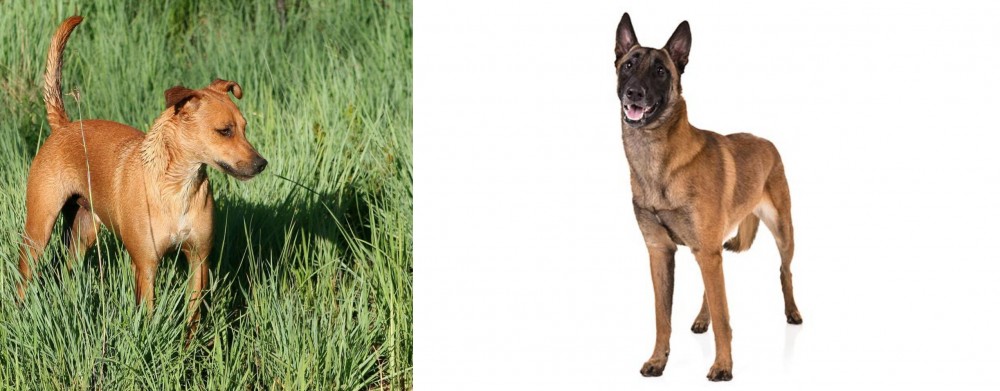 Africanis is originated from South Africa but Belgian Shepherd Dog (Malinois) is originated from Belgium. Africanis may grow 6 cm / 2 inches shorter than Belgian Shepherd Dog (Malinois). Africanis may weigh 11 kg / 25 pounds more than Belgian Shepherd Dog (Malinois). Both Africanis and Belgian Shepherd Dog (Malinois) has almost same life span. Both Africanis and Belgian Shepherd Dog (Malinois) has almost same litter size. Both Africanis and Belgian Shepherd Dog (Malinois) requires Low Maintenance.
Africanis is originated from South Africa but Belgian Shepherd Dog (Malinois) is originated from Belgium. Africanis may grow 6 cm / 2 inches shorter than Belgian Shepherd Dog (Malinois). Africanis may weigh 11 kg / 25 pounds more than Belgian Shepherd Dog (Malinois). Both Africanis and Belgian Shepherd Dog (Malinois) has almost same life span. Both Africanis and Belgian Shepherd Dog (Malinois) has almost same litter size. Both Africanis and Belgian Shepherd Dog (Malinois) requires Low Maintenance.
 Africanis is one of the original African breeds. This breed was not shaped by humans, but they went through the process of natural selection. Humans did not affect this breed by standard breeding practices. Through the history, this breed became stronger and stronger because only the strongest of the breed survived. Africanis descent is the early dog that is originally from ancient Egypt. Approximately 4500 BC was the period of first data about this breed.
Africanis is one of the original African breeds. This breed was not shaped by humans, but they went through the process of natural selection. Humans did not affect this breed by standard breeding practices. Through the history, this breed became stronger and stronger because only the strongest of the breed survived. Africanis descent is the early dog that is originally from ancient Egypt. Approximately 4500 BC was the period of first data about this breed.
As time passes through, Africanis became more and more popular through the whole continent. This breed migrated with people for thousands of years, and now, a modern Africanis is similar to Greyhound dog. The original Africanis can be found in tribes and more traditional people. One of the oldest breeds in the world is one of the lasts that has been recognized by Kennel Union of Southern Africa.
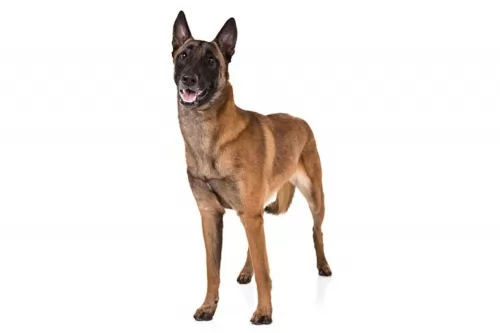 The Belgian Malinois is one of 4 Belgian Shepherd varieties. The dogs were developed- and hail from Belguim. The Malinois has a short, fawn colored coat. The American Kennel Club recognizes that the Malinois is a separate breed from the other 3 varieties. It was in 1892 that Professor Reul wrote the first Belgian Shepherd Dog standard, recognizing 3 varieties – dogs with short coats, dogs with long coats and dogs with rough coats.
The Belgian Malinois is one of 4 Belgian Shepherd varieties. The dogs were developed- and hail from Belguim. The Malinois has a short, fawn colored coat. The American Kennel Club recognizes that the Malinois is a separate breed from the other 3 varieties. It was in 1892 that Professor Reul wrote the first Belgian Shepherd Dog standard, recognizing 3 varieties – dogs with short coats, dogs with long coats and dogs with rough coats.
Today's Malinois goes back to a breeding pair owned by Adrien Janssens. It was in 1885 that he bought a fawn, rough-haired dog, breeding the dog with a short-haired dog named Lise de Laeken. After other breedings, the two dogs were recognized as ancestors of the modern Belgian Shepherd Dogs.
The city of Malines formed a club for the promotion of these fawn short hairs and the name Malinois became synonymous with them. In March 1992, the American Belgian Malinois Club received AKC parent club status.
 Africanis origins from South Africa. The average Africanis weights 25-45 kg, with a height of 50-60cm, while females are slightly smaller. They are medium sized dogs who are friendly, but also independent and territorial. They can are good pets for training, but it requires persistent work.
Africanis origins from South Africa. The average Africanis weights 25-45 kg, with a height of 50-60cm, while females are slightly smaller. They are medium sized dogs who are friendly, but also independent and territorial. They can are good pets for training, but it requires persistent work.
The lifespan of Africans is 10-12 years, but lifespan always depends on health, genetics, and care of the dog. Therefore, if they are healthy and well cared they can live longer than average.
Litter Size variates a lot, so female can have 2-8 puppies.
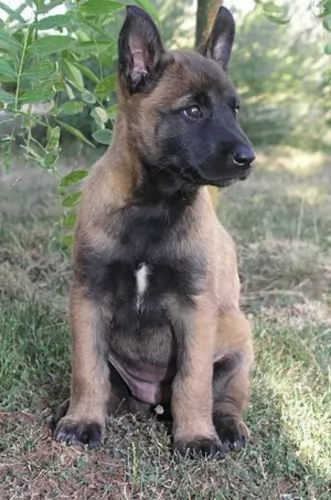 The Malinois is a medium-size Belgian shepherd dog. People sometimes mistake them for the German Shepherd as they are fairly similar to look at. The Malinois however is a smaller, lighter boned dog with naturally upright ears and a black-masked face. He is shorthaired and fawn-colored with black tips on the hairs, although other colors are brown or red too. He is an intelligent and active dog, always having been used for herding-, police- and rescue work.
The Malinois is a medium-size Belgian shepherd dog. People sometimes mistake them for the German Shepherd as they are fairly similar to look at. The Malinois however is a smaller, lighter boned dog with naturally upright ears and a black-masked face. He is shorthaired and fawn-colored with black tips on the hairs, although other colors are brown or red too. He is an intelligent and active dog, always having been used for herding-, police- and rescue work.
You’ll find the Malinois somewhat unpredictable as some are friendly and confident while other can be shy and withdrawn around strangers. This is a dog who loves to be around his human family, but to bring out the best in him, training and socialization classes will be necessary. Well-socialized Malinois are always good with children and other pets, more so if they’ve been raised with them.
 Africanis is a very good and healthy breed. They are very intelligent and friendly breed. They are not an aggressive breed, but they tend to protect the master. Africanis is a natural guard dog. This breed is used to being alone because for the centuries they migrated close to humans, but they also have been independent.
Africanis is a very good and healthy breed. They are very intelligent and friendly breed. They are not an aggressive breed, but they tend to protect the master. Africanis is a natural guard dog. This breed is used to being alone because for the centuries they migrated close to humans, but they also have been independent.
Training Africanis is not very hard. They tend to learn very quickly. Positive training with awards is the best way to train your Africanis. The old-fashioned way of training dogs with punishment is not recommendable for Africanis. They are intelligent breed who requires patience and constancy.
They are very good with other animals too, but they need proper socialization. Africanis requires daily exercise so if you keep your dog in the apartment it should have few daily walks. Africanis can live in the apartments though.
Overall, they are very healthy breed, so with regular vet checks and proper care, they are perfect pets for the whole family since they are great and gentle with small children and kids.
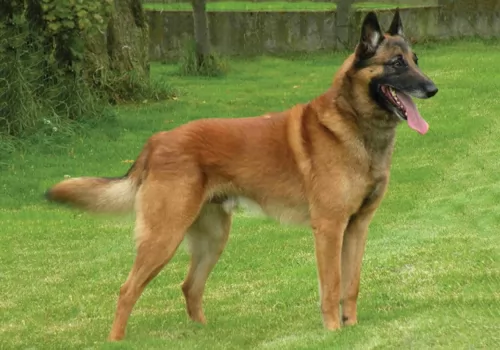 The Belgian Malinois makes a wonderful guard dog and he works hard to ensure that his human family, whom he adores, are well protected under his watch. They’re such intelligent dogs too that you may feel inclined to pass over some of your chores to him.
The Belgian Malinois makes a wonderful guard dog and he works hard to ensure that his human family, whom he adores, are well protected under his watch. They’re such intelligent dogs too that you may feel inclined to pass over some of your chores to him.
He responds well to training, and to get the best from this breed, start with training and socialization as soon as you bring your puppy home.
Socialization is excellent as it introduces your puppy to different people, animals as well as situations.
He is an adaptable dog and can live in an apartment if he is well exercised. He can be your devoted and loyal friend for a good number of years but you will have to do your part in providing him with the best care possible.
 The great thing about Africanis is that this breed is very healthy. Thousands of years of evolution made this breed one of the toughest breeds in the world. They can survive very tough conditions. Africanis has a very healthy immune system too. It evolves so strong that there are no internal or external parasites that can harm the dog.
The great thing about Africanis is that this breed is very healthy. Thousands of years of evolution made this breed one of the toughest breeds in the world. They can survive very tough conditions. Africanis has a very healthy immune system too. It evolves so strong that there are no internal or external parasites that can harm the dog.
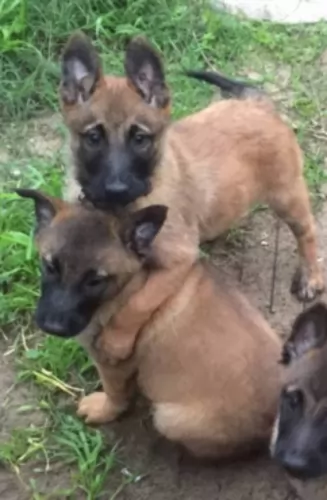 Belgian Malinois are generally healthy dogs. However every dog, regardless of breed, can pick up illnesses, and it is always wise to be aware of some of the diseases your Malinois might face.
Belgian Malinois are generally healthy dogs. However every dog, regardless of breed, can pick up illnesses, and it is always wise to be aware of some of the diseases your Malinois might face.
An inherited condition where the thigh bone doesn't fit properly into the hip joint. As the dog ages, arthritis can develop.
A degenerative eye disorder that can lead to blindness.
Brush his teeth at least 2 or 3 times a week to remove tartar build-up. Too much plague leads to inflamed gums, bad breath, pus inside the mouth and even loss of teeth.
 Africanis has used to eat everything, so this breed does not require any special treatments. 2-2.5 cups of dry high-quality food would be more than enough to have healthy and well feed the dog. But have in mind that feeding the dog depends on daily activity and size. If the dog is more active, an extra cup wouldn’t be a problem for a dog to eat.
Africanis has used to eat everything, so this breed does not require any special treatments. 2-2.5 cups of dry high-quality food would be more than enough to have healthy and well feed the dog. But have in mind that feeding the dog depends on daily activity and size. If the dog is more active, an extra cup wouldn’t be a problem for a dog to eat.
Africanis puppy should eat more times per day than an adult dog. 3-5 meals per day of quality dry food are good measure to feed your puppy Africanis.
Since Africanis has short hair they are very easy to groom and care. Few brushes on a weekly basis with occasional bathing would be more than enough to have a clean and healthy dog.
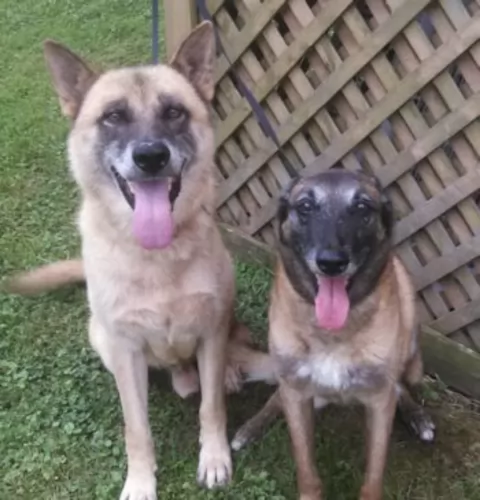 Because the Malinois is a constant shedder, with a couple of heavy shedding periods during the year, you’ll need to be conscientious with his grooming and brush him at least twice a week to get rid of loose hairs and to give his thick coat a glossy, healthy look to it.
Because the Malinois is a constant shedder, with a couple of heavy shedding periods during the year, you’ll need to be conscientious with his grooming and brush him at least twice a week to get rid of loose hairs and to give his thick coat a glossy, healthy look to it.
Because of their high energy, Malinois aren’t recommended for couch-potato type owners. It will be cruel to buy such a dog and to leave him to waste away with boredom and frustration in your back yard. He’ll want lots of rough and tumble, ball games, runs in the park or in the country and long walks.
Belgian Shepherd Malinois puppies are vulnerable when they’re tiny, and it would be wise to speak to your vet about superb nutrition to build up a puppy’s immune system.
An excellent way to ensure the health of your growing Malinois is to give him a home prepared meals along with commercially manufactured food recommended by your vet. You can’t just put a bowl of commercially manufactured dog food in front of him day after day month after month.
Apart from what your vet recommends, give him some brown rice, some cooked vegetables and some raw meat. Raw meat will ensure he can fight of skin infections. The age of the dog, emotional state and environmental influences can all play a role in skin diseases with dogs, but by ensuring some raw meat in his diet, the immune system is strengthened and skin disorders are eliminated. Always ensure a steady supply of fresh water.